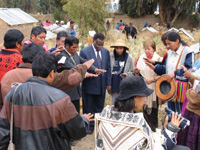WCC United Nations liaison office
Work on Indigenous Peoples
Background
Indigenous Peoples in different parts of the world have continuously been discriminated against, being denied their culture, identity, language and ancestral land. At present, the significant natural, cultural, and social resources of Indigenous Peoples are to a certain extent being recognized. Nonetheless, they continue to face high rates of material poverty and suffer exclusion and discrimination in labour markets, while witnessing the degrading quality of their natural surroundings. With the accelerating deterioration of the global economic and political situation, Indigenous Peoples also face grave threats to the continuity and sustainability of their cultures and traditional way of life.
Churches have found that in order to fulfil the objectives of poverty elimination, sustainable development, and the strengthening of respect for human rights and democracy, building relationships with Indigenous peoples is imperative. Their right to define for themselves their political, economic, cultural and spiritual development, and to participate in the democratic processes of their country, is vital, as is the respect for and appreciation of indigenous wisdom and the distinct contributions Indigenous People can make. |

WCC general secretary participates in a Christian ceremony to remember the dead in the cemetery in Kheasqapa, some 150 kilometers from La Paz (2004) |

Some 40,000 people, mostly Dalits and Indigenous People, live in the Delhi slum of Kusumpur (1999)
|
SEE ALSO: WCC/Justice, Peace & creation work on Indigenous Peoples |
|

WCC actions to date
Since the 1970s, the WCC has supported the struggles of Indigenous Peoples through its Programme to Combat Racism and Indigenous Peoples. It has participated in various UN fora, including a UN Working Group on Indigenous Populations, an Inter-sessional Working Group on a draft Declaration of Indigenous Peoples' Rights, and a Permanent Forum for Indigenous Issues. Further, it has engaged in theological reflection, historical analysis, ethical debate, networking and advocacy at the UN on the inter-related issues of land, culture and spirituality, power and identity, sovereignty and self-determination.
The WCC Indigenous Peoples’ Programme also addresses issues such as intellectual property, sustainable development and climate change. The WCC continues to support the struggles of Indigenous Peoples, most recently through a study on Education and Indigenous Peoples that looks at how values and knowledge are transmitted within Indigenous communities.

WCC UN Liaison Office aims
- promote awareness of the issues and concerns of Indigenous Peoples
- strive to bring the cultural dimension of Indigenous People, especially their different languages and ways of expressing themselves, to the UN
- affirm Indigenous Peoples' ancestral knowledge, identity and contributions to caring for the Earth.
Work methods
- participate actively in the Permanent Forum for Indigenous Issues
- support the participation of Indigenous people in various UN fora, including the UN Working Group on Indigenous Populations and the Permanent Forum for Indigenous Issues.
Network
Permanent Forum for Indigenous Issues
UN Working Group on Indigenous Populations
Inter-sessional Working Group on a draft Declaration of Indigenous Peoples' Rights
|










